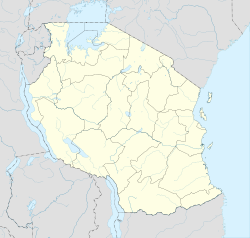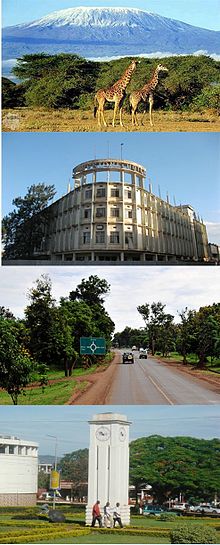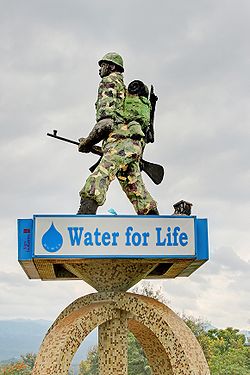- Moshi
-
Moshi — Town — Moshi panorama with Kilimanjaro in the background Moshi MapLocation of Moshi Coordinates: 3°20′05.58″S 37°20′25.37″E / 3.3348833°S 37.3403806°ECoordinates: 3°20′05.58″S 37°20′25.37″E / 3.3348833°S 37.3403806°E Country Tanzania Districts Government – Mayor Bernadette Kinabo Population (2002) – Total 144,336 Time zone GMT +3 Area code(s) +255 Moshi is a Tanzanian town with a population of 144,739 (2002 census) in Kilimanjaro Region. The town is situated on the lower slopes of Mt Kilimanjaro, a volcanic mountain that is the highest mountain in Africa.
Moshi is home to the Chagga and Maasai tribes and lies on the A 23 Arusha–Himo east–west road connecting Arusha and Voi, Kenya. Just to the east of Moshi is the intersection with the B 1 north–south road eventually connecting with Tanga and Dar es Salaam. Moshi is often considered the cleanest town in East Africa.
Contents
Education
Thanks to the government, local authorities, and Catholic and Lutheran missions, Moshi has universal primary education and the highest literacy rate in the vicinity.[1] Moshi is a host to a number of higher education facilities; among others as Part of Tumaini University, Kilimanjaro Christian Medical college (KCM College) and The Stefano Moshi Memorial University College (SMMUCo), Mwenge University College of Education (MUCE)-Part of Saint Augustine University of Tanzania, Moshi University College of Co-operative and Business Studies (A constituent college of Sokoine University of Agriculture), The College of African Wildlife Management-Mweka (Mweka College) and Kilimanjaro school of Pharmacy (KSP).
The Kilimanjaro Christian Medical College (KCM College) was started in 1997 and offers a number of medical courses. The Medical college is situated within the Kilimanjaro Christian Medical Centre (KCMC) complex, about 6 km from Moshi Town, Kilimanjaro Region on the slop of the snow-caped Mount Kilimanjaro.
The Stefano Moshi Memorial University College (SMMUCo) has been developed from the Masoka Management Training Institute (MMTI) and Mwika Lutheran Bible College (LBC). It belongs to the Evangelical Lutheran Church in Tanzania - Northern Diocese and it is a Multi Campus University College. Currently SMMUCo has a campus in Masoka, Mwika and Moshi Town. Masoka Campus is currently serving as the main Campus of SMMUCo. Projected campuses are Machame, Siha and Karatu. The main Campus of SMMUCo will be at Machame Campus in Hai District.
Mwenge University College of Education (MWUCE) offers a model of professional excellence, as a center for training teachers and students to become clear thinkers while providing a holistic approach to learning and teaching through promotion of flexible teacher training programmes focused on appropriate methodologies. Mwenge University is situated 10 km north of Moshi Town, on the lower slopes of Mt. Kilimanjaro. MWUCE lies at 1000 metres above sea level and enjoys a moderate climate. It is about 15 minutes drive from Moshi Town and can be reached by bus to Ushirika wa Neema. Moshi can be reached from other parts of Tanzania and East Africa with regular bus services from all parts of Tanzania as well as Kenya and Uganda. Moshi can easily be reached from overseas as it is only 40 km east of Kilimanjaro International Airport.
MUCCoBS (formerly Ushirika College) is the oldest training institution in Tanzania located along the Sokoine Road in the Moshi Municipality. MUCCOBS with accumulating experience of 43 years, in the fields of co-operative accounting, co-operative management and rural development has of recently turned into other expertise in accounting, management, marketing, auditing and cooperative development employed in different institutions within and outside Tanzania. The Institution grew from a College enrolling only 150 students, conducting tailored courses to a University College with a capacity of 1500 students. MUCCoBS came into being as a result of upgrading the former Cooperative College into a Constituent College of Sokoine University of Agriculture (SUA) in May 2004. Consequently, the name changed to Moshi University College of Co-operative and Business Studies.
The College of African Wildlife Management-Mweka (Mweka college) was established following the Arusha Manifesto (1961) in 1963 as a pioneer institution for the training of African wildlife managers. Since this time, the College has been a leader in providing quality wildlife management training in Africa, and has trained over 4,000 wildlife managers from 28 African countries and 18 non-African countries. The majority of the College's students come from the SADC region, although the College opens its doors to all students with an interest in African Wildlife Management.
Kilimanjaro School of Pharmacy (KSP) which is currently the only pharmacy school providing competence based training for different levels of pharmaceuticals cadres to a diploma level run by St Luke Foundation. St Luke Foundation is a registered trust founded to provide broad spectrum services to an African population that faces serious deficiencies in pharmaceutical and health systems. A trust resulted from the Infusion Unit Project of Evangelical Lutheran Church in Tanzania (ELCT) with activities in countries including Tanzania, Kenya, DRC, Ethiopia etc.
Moshi Municipality also contains various schools including Mawenzi Secondary School, Majengo Secondary School, Kiboriloni Secondary School, International School Moshi, Moshi Technical School and Kibo Secondary School.
International School Moshi was founded in 1969 and now has 410 students from 43 nationalities on two campuses in Moshi and Arusha. Moshi campus has 220 students, including 100 boarders, and offers a full range of courses from pre-kindergarten to International Baccalaureate Diploma. It has been an International Baccalaureate World school since 1977 when it became the first IB school in Africa.[2]
Mawenzi Secondary School started out as the Indian School of Moshi in 1956. It is now a thriving school of 1100 pupils. A-Level students are all female boarders and are drawn from all over Tanzania. The school specialises at A-Level in Kiswahili, Geography, History, and English. The school operates a double shift system for junior pupils (Form 1–4). All subjects are taught in English, apart from Kiswahili and French. Mawenzi School has had a link with Buckie High School in Scotland since 1987. Pupils and teachers have travelled between Tanzania and Scotland on many occasions. There are also various English Academic Schools with primary, secondary and high school education i.e. Northern highland and Eden Garden schools.
There are a number of NGOs in Moshi assisting with education. One of them is Give a Heart To Africa NGO offering free education to adult women and assisting several of them with starting their own business. They are run solely by volunteers thus are always in need of help from international volunteers. Volunteers teach English, Computers and business with developed lesson plans and translator in each classroom. Currently, they are located next to MUCCoBS.
Medical care
The main hospital in the area is the Kilimanjaro Christian Medical College. This huge sprawling complex serves a population of over 11 million individuals. It was opened in March 1971 by the Good Samaritan Foundation.
More recently set up, next to KCMC is the newly formed Kilimanjaro Center for Community Ophthalmology, which is co-directed by PhD Paul Courtright and MD Susan Lewallen, both with years of medical experience in Africa. In 2007, they finished construction of a new building, funded by several NGOs (e.g. Seva Foundation and Google.org) and individuals. The KCCO mostly advises the Eye Center at KCMC, and runs Direct Referral Sites (DRS) to help bring patients to KCMC.
Moshi town plays a host to the Kilimanjaro Clinical Research Institute (KCRI) that evolved out of the Kilimanjaro Clinical Research Centre (KCRC) that was prior established in 2006 by the support from Dutch government through NACCAP and later from EDCTP through VITA study, with EACCR provided resources which were used for physical infrastructure and capacity development for staff till March 2009 when the Kilimanjaro Clinical Research Institute (KCRI) was established.
There is also Mawenzi Hospital where they have a student learning program in their Physical Therapy department in cooperation with Norway, in which Norwegian physiotherapy students in their second and third years come as short term apprentices.
Jaffery Zahanati, established in 2009 by Healthnovations International, provides free medical services in Moshi and surrounding rural areas.
Other institutions and establishments
Moshi Municipality has other institutions/establishments such as the Small Industries Development Organization (SIDO-Moshi), Kilimanjaro Industrial Development Trust (KIDT), Furniture Industry Training Institute (FITI), Mawenzi Regional Hospital, The Moshi Memorial Stadium and a small airport.
Outside Moshi town is a nationally-recognized open-air market known as Kiboriloni. The market, which is loosely structured, has been for decades a regional hub for commodities such as clothing merchandise, fresh food, and house hold items. It operates four days a week, and it can be overly crowded. Most of the operators are local traders and peasants.
Moshi town is connected to the outside World via Kilimanjaro International Airport which is under the operation of Kilimanjaro Airport Development Company (KADCO) and located in Hai District along the Moshi-Arusha Highway in Kilimanjaro Region. Several international and domestic airlines serve the airport, including KLM, Ethiopian Airways, Kenyan Airline, and Presicion Air.
Tourism
Moshi is often overlooked as a tourist destination, with many visitors to Northern Tanzania instead choosing to stay in nearby Arusha. However the town is now host to the Kilimanjaro Marathon which is rapidly growing in popularity and there are several cultural tourism programs operating on the lower slopes of Kilimanjaro. Moshi also serves as the base for many expeditions up nearby Mt. Kilimanjaro, with many climbers staying in nearby hotels and employing locals as guides, porters and cooks.
To promote tourism prospects in the town, an international accredited Kilimanjaro Marathon was established in 2002 and every year, at the end of February. During the race that attracts nearly 4000 people, a standard 42.2 km marathon, a 21.1 km half marathon and a 5 km fun run are run from the town of Moshi, Tanzania. Apart from acting as touristic niche, the race has been set up to promote the sport in Tanzania and has the official backing of the Tanzania Tourist Board, the Tanzania Amateur Athletics Association, the IAAF, and is registered with AIMS.
Industry
There are also a number of manufacturing industries including TPC Ltd (sugar cane and sugar), Bonite Bottlers (carbonated drinks), Serengeti Breweries (beer), Tanzania Breweries Maltings (malt for breweries), Interchem Pharmaceuticals, Kibo match, African Mosfly Industries Ltd, Union Service Stores (grain flour and animal feeds) and Imara (furniture). There are several metalworking workshops such as Simon Engineering, Press Forge and CFW Moshi. Moshi plays a host to a number of agri-industry activities that includes a number of green house farms for flowers and vegetables. Moreover Moshi, host a coffee factory (Milcafe LTD) that specialized in the blending and packaging of tea along with the curing, grinding, and packing of coffee.
Agriculture
Because of its lower altitude with fewer rains, the main crops grown on the higher slopes of Mt Kilimanjaro (bananas and coffee) do not thrive well there, so the outskirts of Moshi are known for extensive farms of maize and beans, grown once per year, during the rainy season (masika).
Moshi was where the Arabica coffee seeds that Catholic missionaries introduced at the end of the 19th century were cultivated. The Kilimanjaro Native Cooperative Union (KNCU) was probably the most efficient and progressive cooperative organization in Africa. The district commissioner, Sir Charles Dundas, started it in the 1920s to enable Chagga coffee growers to compete on equal terms on world markets with the European growers.
Climate
Moshi features a tropical wet and dry climate. The town has a relatively stable climate, which is highly controlled by the presence of Mount Kilimanjaro. This, as well as the altitude of the town, keeps the temperatures lower than surrounding cities, even without the maritime effects that a coastal city enjoys. While nighttime temperatures are relatively consistent throughout the course of the year, averaging around 17 degrees Celsius, Moshi features noticeably higher daytime temperatures during the months of December, January and February when average high temperatures exceed 30 degrees Celsius and noticeably cooler daytime temperatures in the months of June and July, when average high temperatures hovers around 25 degrees Celsius.
Climate data for Moshi Month Jan Feb Mar Apr May Jun Jul Aug Sep Oct Nov Dec Year Average high °C (°F) 33
(91)33
(91)32
(90)29
(84)26
(79)25
(77)25
(77)26
(79)28
(82)31
(88)31
(88)32
(90)29.3
(84.7)Average low °C (°F) 17
(63)17
(63)18
(64)19
(66)18
(64)16
(61)15
(59)15
(59)15
(59)16
(61)17
(63)17
(63)16.7
(62.0)Precipitation cm (inches) 3.0
(1.18)5.0
(1.97)11
(4.3)35
(13.8)23
(9.1)3
(1.2)2
(0.8)1
(0.4)1
(0.4)2
(0.8)6
(2.4)5
(2)97
(38.19)Source: Weatherbase[3] Politics
Moshi has been the base of the opposition politics since the days of struggle for independence. The last Mangi Mkuu (Paramount Chief) of Chagga, Chief Marealle, whose palace was located in Moshi, was the only chief in Tanganyika to have a petition for independence before United Nations. This petition was earlier than that of Julius Nyerere (later first President of Tanganyika), which asked for the independence of the whole country of Tanganyika. Logic prevailed, and United Nation and British governor granted independence to the whole colony of Tanganyika to Mr Nyerere.
Since the introduction of multiparty system in 1992, Moshi has been the bastion of the opposition parties in the country. Moshi Urban parliamentary seat is one of the few seats in the country to be held continuously by opposition since the first multiparty election of 1995. Several presidential candidates and chairpersons of opposition parties, including CHADEMA, NCCR-Mageuzi, TLP, and Demokrasia Makini, hail from Kilimanjaro region that its capital is Moshi town.
See also
References
- ^ "Assignement description". Office Management Adviser, Moshi (Tanzania). Volunteer Service Abroad Aotearoa New Zealand. http://www.vsa.org.nz/volunteer/documents/1766_TAN_ProjectMgmt.pdf. Retrieved 2010-06-16.[dead link]
- ^ "International School Moshi, Moshi Campus". IB World Schools. IBO. http://www.ibo.org/school/000032/. Retrieved 2008-10-23.
- ^ "Weatherbase". http://www.weatherbase.com/weather/weather.php3?s=9736&refer=&units=metric&cityname=Moshi-Tanzania. Retrieved March 7, 2011.
External links
- Sekretarieti ya Mkoa
- Kilimanjaro International Airport
- Kilimanjaro Christian Medical College
- Stefano Moshi Memorial University College
- Mwenge University College of Education
- Moshi University College of Co-operative and Business Studies
- The College of African Wildlife Management
- International School Moshi
- KCMC Hospital Moshi
- Kilimanjaro Clinical Research Institute
- Kilimanjaro School of Pharmacy
- Cornel Ngaleku Children Centre
- Kiliweb – Information site on Moshi and Kilimanjaro
- Kilimanjaro Marathon
- Adventure Alternative; Medical Electives PDF
- Give a Heart To Africa
- kilimanjaro Centre for Orphans and street children
Categories:- Moshi
- Populated places in the Kilimanjaro Region
- Mount Kilimanjaro
Wikimedia Foundation. 2010.




